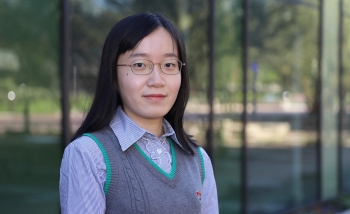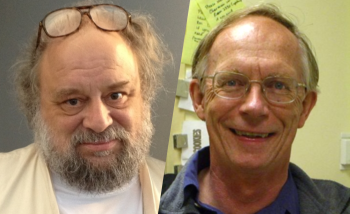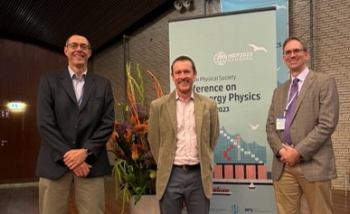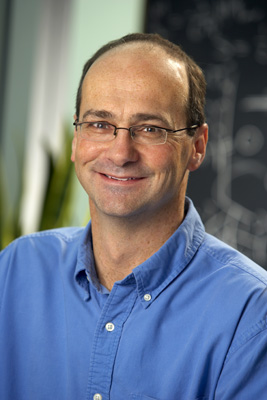Robert Myers is one of Canada's most distinguished string theorists, who has made numerous key contributions in subfields ranging from foundational string theory to gravitational physics to string cosmology.
Several of his discoveries have opened completely new lines of inquiry and are regarded as modern classics. He is perhaps best known for "the Myers effect", a string theoretic analog of the dielectric effect in which certain objects, known as D-branes, respond to external fields, even if they don't carry the charge the field would normally act upon.
Together, his insights have made Myers one of the most widely cited theoretical physicists in the world.
Myers was a founding faculty member of Perimeter Institute and served as its Interim Scientific Director from 2007 to 2008. As the Chairman of the Faculty, he continues to play a key role in building Perimeter into one of the world's leading centres of theoretical physics.
The Vogt Medal is named for nuclear physicist Erich Vogt. He is best known as a founder and long-time director of TRIUMF, Canada's national laboratory of nuclear and particle physics. TRIUMF co-sponsors this award along with the CAP. Upon receiving news of his prize, Myers said, "Canada has a long tradition of research in subatomic physics and continues to be home to a vigorous community of world-class researchers in this field. I am very honoured and grateful to be selected from amongst my colleagues as the recipient of the 2012 CAP-TRIUMF Vogt Medal."
Freddy Cachazo is a mathematical physicist whose work has attracted attention for its immediate usefulness in particle physics and beyond.
Drawing upon a variety of elegant mathematical ideas, Cachazo and his collaborators have developed entirely new methods of calculating scattering processes in gravity and gauge theories. Calculating scattering amplitudes is an essential step in making predictions or analyzing data in several fields of physics. For instance, high energy physicists at the Large Hadron Collider tackle scattering amplitudes routinely.
Before Cachazo, many of these scattering amplitude problems were nearly too complex to calculate. Cachazo's techniques make them not just solvable, but surprisingly simple. The techniques have been adopted in both analysis and simulation, and have already been incorporated into textbooks. The mathematical elegance of Cachazo's techniques may also tell us something new and fundamental about the nature of quantum fields – a possibility that has already attracted wide attention and opened new research directions. Cachazo's work is, therefore, likely to have enduring and far-reaching impact in the search for a simpler, more unified description of nature's physical laws.
The Herzberg Medal is named for Gerhard Herzberg, a long-time director of the Pure Physics department at Canada's National Research Council, whose pioneering work in molecular spectroscopy won him the 1971 Nobel Prize. On being recognized by the Canadian Association of Physicists, Cachazo remarked, "I am very honoured to be awarded the 2012 Herzberg Medal. This medal, named after not only a brilliant scientist, but also someone who had a great impact on Canada's physics community, is truly an inspiration."
ABOUT THE CANADIAN ASSOCIATION OF PHYSICISTS
Physicists contribute significantly to Canada's intellectual and economic vitality through the work of researchers and educators. Since 1945, the Canadian Association of Physicists (CAP) has been helping to inform its members of developments in their field, to raise awareness of physics among youth and the general public, to communicate with policy makers, and to celebrate achievements in Canadian physics. www.cap.ca
ABOUT TRIUMF
TRIUMF is Canada's national laboratory for nuclear and particle physics research and related sciences. As one of the world's leading subatomic physics laboratories, it brings together dedicated physicists and interdisciplinary talent, sophisticated technical resources, and commercial partners in a way that has established the laboratory as a global model of success. Its large user community is composed of international teams of scientists, postdoctoral fellows, and graduate and undergraduate students. www.triumf.ca
Further exploration
About PI
Perimeter Institute is the world’s largest research hub devoted to theoretical physics. The independent Institute was founded in 1999 to foster breakthroughs in the fundamental understanding of our universe, from the smallest particles to the entire cosmos. Research at Perimeter is motivated by the understanding that fundamental science advances human knowledge and catalyzes innovation, and that today’s theoretical physics is tomorrow’s technology. Located in the Region of Waterloo, the not-for-profit Institute is a unique public-private endeavour, including the Governments of Ontario and Canada, that enables cutting-edge research, trains the next generation of scientific pioneers, and shares the power of physics through award-winning educational outreach and public engagement.
You might be interested in




